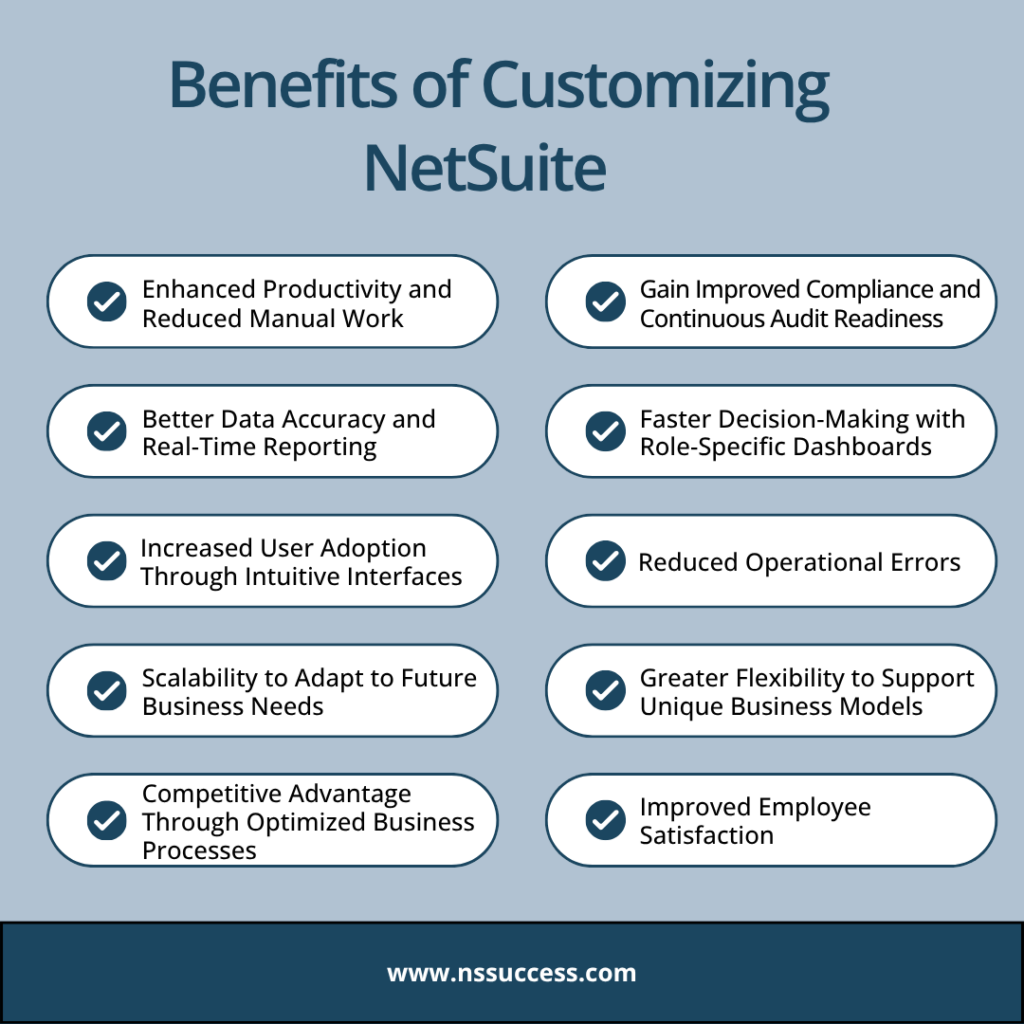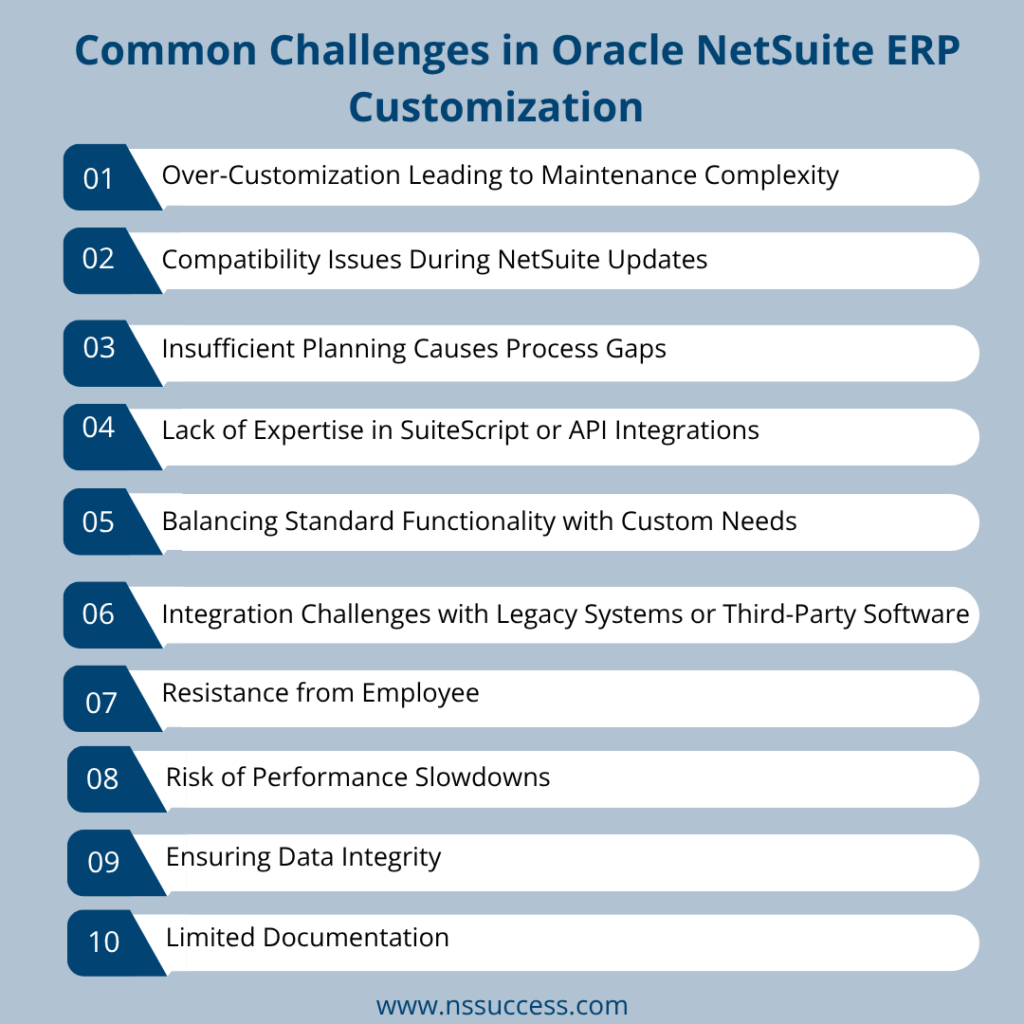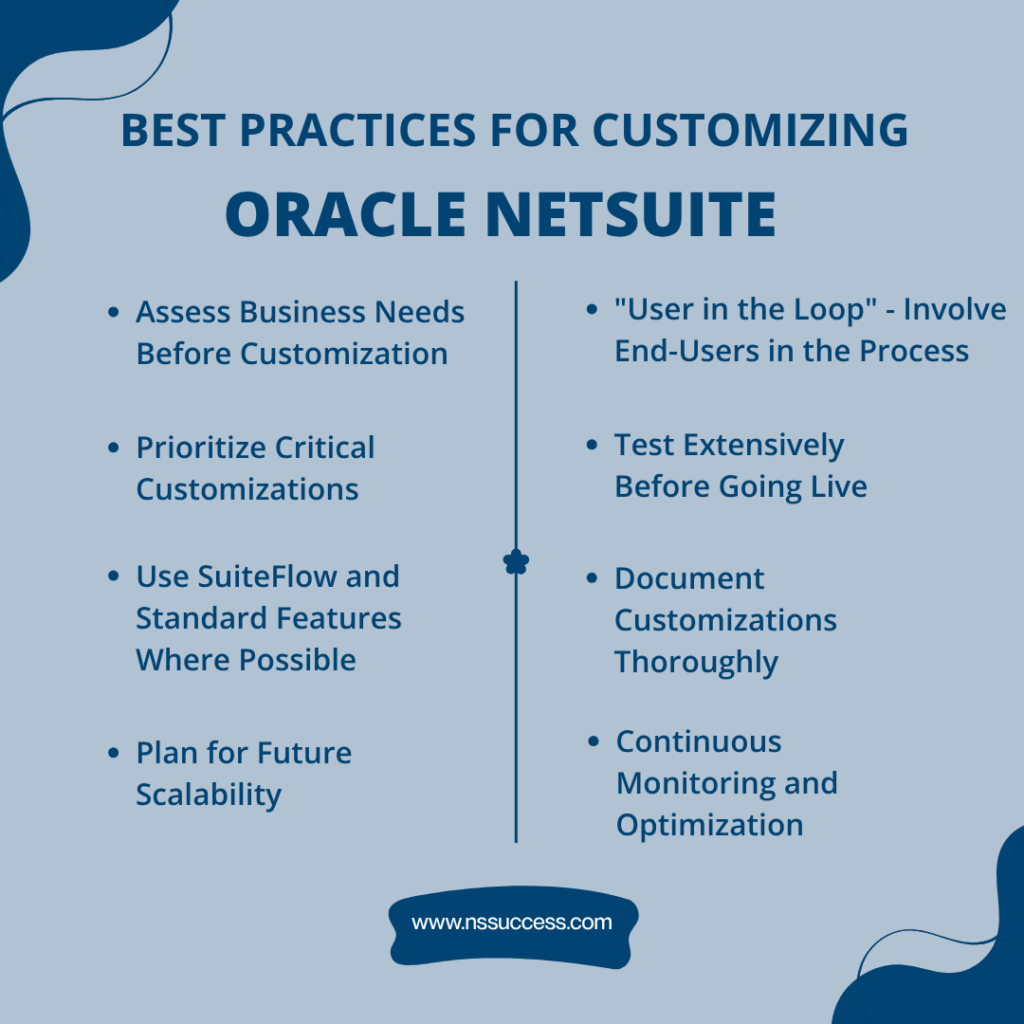
Are you planning to customize Oracle NetSuite – to tailor NetSuite to Your Unique Business Needs ? Read in this post to know more about NetSuite customization, why it matters, its benefits and challenges.
In the modern business world, companies face diverse operational challenges that cannot be addressed with a generic ERP solution. Many organizations invest in ERPs only to discover that off-the-shelf configurations fail to meet their unique business needs. This is why Oracle NetSuite customization has become a critical strategy for organizations aiming to optimize efficiency and improve operational workflows.
Oracle NetSuite is a cloud-based ERP platform that is highly adaptable and customizable. Through the ability to tailor NetSuite, companies can align their ERP system precisely with organizational goals, processes, and reporting requirements. Leveraging ERP customization benefits allows teams to reduce manual work, enhance data accuracy, and improve overall user adoption.Whether it’s streamlining financial processes, automating workflows, or creating executive dashboards, customising NetSuite ensures that your ERP is not just a system, but a business enabler.
Why Customization Matters for Businesses
Each business operates under a unique set of workflows, regulations, and reporting requirements. A generic ERP often fails to account for these differences, leading to inefficiencies and user frustration.
- Industry-Specific Needs: Manufacturing companies require inventory tracking and production process management, while retail businesses need sales dashboards, loyalty program integrations, and point-of-sale data consolidation. Financial institutions demand compliance reporting, audit trails, and complex accounting processes. Service-based organizations focus on project tracking, resource allocation, and client billing processes.
- Operational Efficiency: By implementing NetSuite business customization, organizations can streamline their operations. Customization ensures that each department has tools designed for their specific requirements.
- Data Accuracy: Tailored data capture forms and automated workflows reduce the risk of human error, ensuring more reliable financial and operational data.
- Strategic Advantage: Organizations using ERP tailored solutions can leverage technology to gain a competitive edge. A customized ERP allows businesses to adapt quickly to market changes, launch new services, and support long-term growth strategies.
- Enhanced User Adoption: Employees are more likely to adopt systems that reflect their day-to-day operations. Industry-specific ERP customization ensures that users find the system intuitive and relevant to their responsibilities.
Core Areas of NetSuite Customization
Dashboard and Reporting Customization
Custom dashboards provide critical insights for all organizational levels. Executives, managers, and team members benefit from NetSuite SuiteFlow-enabled dashboards that display metrics relevant to their roles. Examples include:
- Finance dashboards showing revenue trends, expense tracking, and cash flow analysis.
- Sales dashboards highlighting pipeline health, lead conversion rates, and regional performance.
- Operations dashboards with inventory levels, order fulfilment, and supply chain efficiency.
Tailored dashboards help decision-makers monitor performance in real-time, enhancing their ability to act quickly.
Forms and Fields Customization
Customizing forms and fields ensures accurate and comprehensive data collection. Organizations can:
- Design forms that mirror internal workflows, reducing manual adaptation.
- Add fields for unique business requirements, such as custom product attributes or client-specific billing terms.
This type of Oracle NetSuite customization improves operational efficiency and reduces errors, while ERP tailored solutions ensure that data is consistent across all departments.
Workflows and Process Automation
Automation is key to reducing repetitive tasks and enforcing business rules. NetSuite SuiteFlow customization feature allows businesses to:
- Automate approval chains, notifications, and task assignments.
- Streamline operations and ensure compliance with internal policies.
- Reduce the risk of missed deadlines and process bottlenecks.
Automating routine workflows increases efficiency and allows employees to focus on higher-value tasks.
Custom Scripts and SuiteScript
SuiteScript customization extends NetSuite functionality beyond standard capabilities. Organizations can:
- Automate complex pricing calculations.
- Validate entries for financial accuracy.
- Generate custom alerts for exceptions or business-critical events.
SuiteScript customization is particularly useful for businesses with specialized requirements, enhancing ERP integration and operational flexibility.
Integration of NetSuite ERP with Third-Party Applications
Connecting NetSuite with other business tools is essential for streamlined operations. Using ERP integration techniques and NetSuite SuiteTalk API, businesses can:
- Sync data between CRM systems, e-commerce platforms, and specialized software.
- Eliminate manual data transfers in ERP and reduce errors.
- Provide a unified view of customer, sales, and financial information.
Seamless integration ensures that NetSuite serves as the central hub for business operations.
Role-Based Permissions and Access Controls
Security and compliance are critical. Customizing user roles allows organizations to:
- Grant access based on responsibilities, limiting exposure to sensitive data.
- Maintain compliance with industry regulations.
- Create audit-ready reports with controlled data access.
Customization for Mobile Access
Mobile customization empowers field teams and remote employees:
- Access dashboards, approvals, and reporting from anywhere.
- Enable on-the-go collaboration and faster decision-making.
- Maintain productivity across locations and devices.
Benefits of Customizing NetSuite
Customizing NetSuite is more than just adjusting settings; it’s about creating a system that aligns perfectly with your business processes, leading to measurable improvements in efficiency, decision-making, and growth.

- Enhanced Productivity and Reduced Manual Work
By automating routine workflows using NetSuite SuiteFlow, employees spend less time on repetitive tasks. For example, automated invoice approvals or expense validations save finance teams hours each week, allowing them to focus on analysis and strategic work. - Better Data Accuracy and Real-Time Reporting
Custom forms and validation rules ensure the right data is captured at every stage. Role-based dashboards provide real-time insights into financial, operational, and sales data, enabling executives to make informed decisions quickly. This is a clear example of the ERP customization benefits in action. - Increased User Adoption Through Intuitive Interfaces
Employees are more likely to adopt systems that reflect their daily workflows. Industry-specific ERP customizations ensure users see only relevant modules, reducing confusion and frustration. - Scalability to Adapt to Future Business Needs
Thoughtful customization ensures your NetSuite system grows with your business. For instance, adding modular processes for new departments or product lines can be done without overhauling the ERP. - Competitive Advantage Through Optimized Business Processes
A tailored ERP supports unique business strategies, from differentiated pricing models to advanced inventory management. Businesses can respond faster to market changes, which directly impacts competitiveness. - Gain Improved Compliance and Continuous Audit Readiness
Customized workflows enforce approvals, internal controls, and audit trails. This reduces compliance risks and ensures organizations can easily meet regulatory requirements. - Faster Decision-Making with Role-Specific Dashboards
Executives can access KPIs instantly, project managers can track progress, and finance teams can monitor cash flows without manually gathering data — saving hours each week. - Reduced Operational Errors
By enforcing business rules and validation checks through SuiteScript customization, common errors such as duplicate entries, incorrect pricing, or missed approvals are minimised. - Greater Flexibility to Support Unique Business Models
Businesses with complex structures — multi-entity setups, international operations, or unique service offerings- benefit from an ERP that can be tailored to handle their specific scenarios. - Improved Employee Satisfaction
Customizations reduce friction in daily tasks, making employees’ work simpler and more efficient. Teams are more engaged, productive, and motivated when systems align with their needs.
Common Challenges in Oracle NetSuite ERP Customization
While customization brings significant benefits, organizations often encounter several challenges during NetSuite implementation:

- Over-Customization Leading to Maintenance Complexity
Adding too many scripts or unique workflows can make the system difficult to maintain. Every upgrade may require additional testing to ensure custom features remain compatible. - Compatibility Issues During NetSuite Updates
Frequent updates in NetSuite may conflict with existing customizations. Without careful planning, businesses can face downtime or disrupted workflows during version upgrades. - Insufficient Planning Causes Process Gaps
Rushing into customization without fully analysing workflows can create gaps or redundancies in processes, affecting efficiency and reporting accuracy. - Lack of Expertise in SuiteScript or API Integrations
Complex customizations require technical expertise. Businesses without internal NetSuite specialists may struggle to implement and maintain custom scripts or ERP integrations. - Balancing Standard Functionality with Custom Needs
Over-customizing can result in replicating functionality that NetSuite already offers. Identifying which features to customize versus using standard modules is crucial. - Integration Challenges with Legacy Systems or Third-Party Software
Synchronizing data between NetSuite and other systems can be challenging, especially if legacy software has outdated formats or limited API support. - Resistance from Employees
Change management is key. Employees accustomed to old workflows may resist new processes, delaying adoption and reducing efficiency. - Risk of Performance Slowdowns
Poorly optimised workflows or excessive scripting can slow down system performance, impacting end-user experience. - Ensuring Data Integrity
Complex customizations may introduce risks of incorrect data mapping or errors in multi-step workflows, affecting financial reporting and decision-making. - Limited Documentation
Lack of thorough documentation for customizations can make future maintenance, audits, or training more difficult.
Best Practices for Customizing Oracle NetSuite
Implementing customizations correctly is key to maximising benefits while minimising challenges. Here’s how businesses can approach NetSuite customization effectively:

- Assess Business Needs Before Customization
Conduct workshops with stakeholders to document workflows, reporting requirements, and pain points. Understanding current processes ensures that customizations address real business needs. - Prioritize Critical Customizations
Focus on high-impact areas first, such as finance automation, sales dashboards, or inventory workflows. This approach reduces complexity and delivers immediate value. - Use SuiteFlow and Standard Features Where Possible
Avoid unnecessary scripts. Leveraging built-in workflows reduces maintenance costs and ensures smoother upgrades. Use SuiteScript customization only when standard functionality cannot meet requirements. - Plan for Future Scalability
Design customizations that can accommodate business growth, new departments, and additional product lines without major overhauls. - “User in the Loop” – Involve End-Users in the Process
Collect feedback from employees who will use the system daily. Early involvement increases adoption rates and ensures usability. - Test Extensively Before Going Live
Conduct pilot testing with select users to identify errors, inefficiencies, or gaps in workflows. Testing minimises disruption during full rollout. - Document Customizations Thoroughly
Maintain detailed records of all workflows, scripts, roles, and integrations. Documentation ensures smoother future upgrades, training, and audit readiness. - Continuous Monitoring and Optimization
Track usage metrics and user feedback. Refine workflows, dashboards, and scripts based on real-world performance to maintain ERP efficiency over time.
Final words
A thoughtfully customized NetSuite ERP ensures alignment with your business goals, enhances operational efficiency, and maximises ROI. Organizations that invest in NetSuite ERP customization guide strategies experience better user adoption, higher compliance, and scalable growth.“Partner with NSSuccess to customize your NetSuite ERP and achieve a solution perfectly tailored to your business.”

 “NS Success” is the NetSuite Consulting Practice of Dhruvsoft Services Private Limited – a leading NetSuite Solution Provider Partner from India – providing services worldwide …
“NS Success” is the NetSuite Consulting Practice of Dhruvsoft Services Private Limited – a leading NetSuite Solution Provider Partner from India – providing services worldwide …